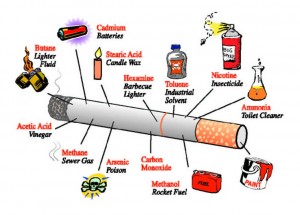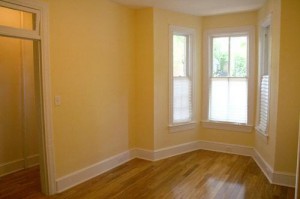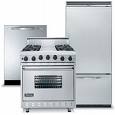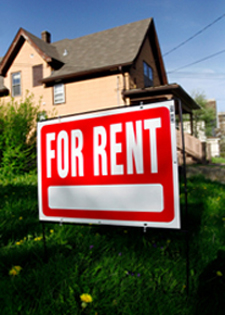Posted by Teresa on December 7, 2012 under Landlord Tips, Legal | 
 The trend in rental properties is definitely swinging toward smoke-free. Tenants are demanding it, an landlords are seeing that the liability and costs associated with smoking inside rental properties makes it difficult to keep allowing it.
The trend in rental properties is definitely swinging toward smoke-free. Tenants are demanding it, an landlords are seeing that the liability and costs associated with smoking inside rental properties makes it difficult to keep allowing it.
Many tenants are sensitive to cigarette smoke. Even if you thoroughly clean the unit, paint, replace carpets and change out the blinds, some tenants will still smell the odor of the previous tenant’s smoke. It just doesn’t make for a pleasant living situation, and you could lose a good tenant over it.
Old cigarette smoke is a health risk, too. Particulates in the exhaled smoke stay around for longer than you might think. They are in the dust floating around in the air; they settle in cracks and crevices; and they set the stage for long-term health problems—particularly for children and individuals with lung or breathing issues, such as asthmatics. New studies show that it’s not just second-hand smoke that is potentially harmful. In other words, you don’t have to directly breathe in someone else’s smoke to be harmed—you could be in a room today that someone smoked in yesterday, and still be affected.
A study a couple of years ago focused on 5,000 children who lived in smoke-free residences, both detached and multi-family. It found that overall, 73% of the children were still exposed to tobacco—but those who lived in apartment buildings had much higher instances of nicotine in their blood (84.5%, compared to 70% of kids in detached homes).
The poisons and chemicals in tobacco smoke linger. They travel down hallways, and through ducting and shared walls. The long-term affects on children and other vulnerable populations are not known now. But do you want to be partly responsible for a child’s future health problems? Turning your rental apartments into smoke-free housing is good for everyone—your current tenants, your future tenants and their children, who are the most innocent victims of other people’s smoking habits.
Posted by Teresa on August 17, 2012 under Landlord Tips | 
 Landlords and property managers often repaint rental housing walls and ceilings between tenants. Others have carpets professionally cleaned. Many do both. But is there an obligation for landlords to perform this maintenance?
Landlords and property managers often repaint rental housing walls and ceilings between tenants. Others have carpets professionally cleaned. Many do both. But is there an obligation for landlords to perform this maintenance?
According to our clients, some tenants think there is. However, that’s just not true. There are no laws or regulations regarding how often rental property owners must clean carpets, paint walls, replace appliances, fix ceiling fans or do any other type of cosmetic upgrades.
Smart landlords know that a fresh coat of paint and clean carpets will go a long way toward attracting quality new tenants. Who wants to live in a house or apartment with scuffed-up walls, chipped paint, dirty carpets or broken blinds?
Investing a few hundred dollars in new paint and carpet cleaning is an investment in your property, not an expense you might convince yourself you can’t afford. And remember, if the carpet is not in the same condition as when the tenant moved in, you may deduct cleaning expenses from the security deposit.
What about long-term tenants? Are they required to clean carpets, or is that a service landlords should provide? Tenants are required to keep rental properties in good condition, and that includes keeping things clean. But offering to clean carpets for long-term tenants is a smart move—it makes them happy, and helps the carpet last longer.
Posted by Teresa on June 3, 2011 under Landlord Tips | 

While the housing market is still troubled, the rental market is strong from coast to coast. With vacancies low, you might be thinking that you don’t need to do a thing to keep prospective tenants interested in your rental properties.
But being in the rental property business means generating as much rental income as possible. And if you can make your rental units more attractive to prospective tenants, you may be able to attract better tenants and make more income, too.
In fact, upgrading your rental is not an expense—rather, it’s an investment that should earn you a return. Compare the cost of each upgrade with the corresponding possible increase of rent to determine whether it makes sense to do it.
Perhaps you don’t need to completely renovate every rental unit. Think about ways to maximize the rent you can charge, based on size, location and condition of the rental unit, as well as what the competition is charging. Here are some possible upgrades that won’t break the bank, and can push your rent up:
Kitchen: Replacing countertops and painting cabinets will change the entire look of the kitchen. If you’re pursuing a higher-end tenant, replace those old formica countertops with granite. And if the kitchen has tired old oak cabinets, give them a fresh coat of white paint and some new hardware: instant style!
Bathroom: You can easily replace a worn-out vanity with a new one; add a new faucet, a new light fixture and a nice-looking sink—and the entire room changes. If the flooring has seen better days, large tiles are not very expensive; or, install a solid piece of marmoleum to make a big difference.
Outdoors: Spruce up the patio area or add a small deck. Tenants love having space to relax outside.
Invest in New Appliances: There’s nothing worse-looking to a prospective tenant than a dirty or worn out old stove, refrigerator or dishwasher. Look for a good deal on a package—or buy used. You can find great deals on nearly-new appliances on Craigslist.
Closet Space: Find ways to add storage. Tenants love walk-in closets and built-in shelves. Easy-to-install closet systems are available at most hardware stores and they can completely change the look and functionality of every closet.
If you want to attract higher-end tenants—and increase your rental income—these simple upgrades can be a quick and easy way to do it.
Learn more about protecting your rental property and assets through tenant background checks. Proper tenant screening will ensure you are leasing to the best possible tenants.
Posted by Teresa on September 28, 2010 under Landlord Tips | 
 Many human resources managers are fans of the exit interview, where a soon-to-be ex-employee is asked a series of questions about his or her time with the company. They generally use the employee’s feedback to monitor procedures and gain insight into problem areas. Presumably, they will take the information gathered and make improvements.
Many human resources managers are fans of the exit interview, where a soon-to-be ex-employee is asked a series of questions about his or her time with the company. They generally use the employee’s feedback to monitor procedures and gain insight into problem areas. Presumably, they will take the information gathered and make improvements.
Some employees use the exit interview as an excuse to unload every frustration about the company, the boss and the co-workers they were doomed to work beside. But most HR folks know that they can be a source of good, honest feedback—after all, with no chance of repercussion, an employee who’s already resigned can be completely honest.
Haven’t you often wondered why your good tenants leave your rental property? Perhaps you routinely ask, but have you considered expanding on the simple “why are you moving?” into your own version of the exit interview? It’s good to know what went wrong and why a good tenant is moving. They are your perfect focus group—they are your target market, passed your screening process and apparently liked your rental property enough to live there. But something made them move. As a landlord, it’s your job to find out why they’re leaving—and how to prevent it next time.
Here are some questions you can ask tenants who are moving out:
- Why are you moving? (Obvious, but necessary.)
- Where are you going? This question is not intended to elicit an address—remember, you’re not interested in stalking the tenant! You want to know generally where they’re going—across town? Leaving the state?
- What do you think about the rent for this unit? Is it fair? Too high? Too low? These answers can tell you what the market will actually bear.
- How did you find your new place? This can help you determine where to advertise your new vacancy!
- How would you describe your experience renting here? This is an open-ended question that can result in all types of answers.
You may hear an earful about the other tenants. You may hear some unpleasant things about yourself as a landlord. Most likely, it will be a mix of things you can do something about and things you can’t. The goal is to get good feedback on how to improve your rental property to keep good tenants from moving away.
Posted by Teresa on November 5, 2009 under Housing Trends | 
 Where are all the tenants? Some are moving back home with mom and dad. Or returning to school and living with relatives. Others took in roommates to help pay the rent, or are staying with friends temporarily.
Where are all the tenants? Some are moving back home with mom and dad. Or returning to school and living with relatives. Others took in roommates to help pay the rent, or are staying with friends temporarily.
These are some of the reasons tenants are out of the rental market, causing the U.S. apartment vacancy rate to rise to 7.8% in the 3rd quarter. This 23-year high occurred despite landlords nationwide lowering rents. Reis, Inc., a real estate research firm that published the vacancy report, stated that the peak has not yet been reached; they expect the number to climb above 8% in the coming months.
Nervous landlords are looking toward the traditionally slow 4th quarter with little hope for improvement, which is expected sometime in 2010—perhaps as soon as the second quarter.
While vacancies increased, rents have declined for four quarters in a row—which may have kept the vacancy rate from soaring even higher. Landlords have responded quickly to market conditions, including over supply, and lowered rents to keep tenants. Rents are expected to stay soft for at least another year.
Oversupply will continue to be a contributing factor to the vacancy problem. 73,000 apartment units have come on the market in the first three quarters of 2009, and 42% of them remain vacant, according to Reis. The bright spot is that new apartment construction has slowed down to a trickle, so eventually, demand will catch up to supply.
As unemployment hovers near 10% nationwide, and benefits start running out, rent money is disappearing, too. Simply put, folks with no rent money cannot be tenants. Landlords will need to continue aggressively seeking out new tenants to fill vacancies, offer incentives to good tenants to get them to stay, and hold on until the job market improves—when there are more people with money to spend on housing.
Especially in a down economy, we recommend you
screen all tenants as part of your application process. For more landlord resources, including forms and information on
tenant screening, turn to
E-Renter.com. .
Posted by Teresa on November 2, 2009 under Landlord Paperwork and Forms, Landlord Tips | 
 Keeping rental units filled: it’s the number one job of any landlord or property manager. If you have tenants who want to renew their leases, then you are doing it well! Before you decide whether or not to allow a tenant to renew her lease, consider the pros and cons:
Keeping rental units filled: it’s the number one job of any landlord or property manager. If you have tenants who want to renew their leases, then you are doing it well! Before you decide whether or not to allow a tenant to renew her lease, consider the pros and cons:
The pros:
1. There is no “break-in” period as with a new tenant;
2. Both sides know what is expected;
3. Current tenant is already agreeable to your terms;
4. No costly repairs, repainting, and advertising for a new tenant;
5. Landlord knows the tenant’s habits and behavior—so, no surprises;
6. Most important: no loss of rental income!
The cons:
1. You might be “stuck” with a less-than-ideal tenant for another year;
2. There are no guarantees that the tenant will continue to pay rent on time;
3. The tenant might become less diligent about following your rules;
4. Tenant’s job situation and/or income could change in between lease signing.
Even if you are not 100% enthusiastic about 100% of your tenants, those who pay their rent on time and cause little trouble are like gold—and never more so than in the soft rental market we’re in now. It’s usually in the best interests of both parties to renew the lease.
How to Renew Leases
Since rental agreements without renewal clauses expire automatically at the end of lease period, it’s a good idea to approach your tenant at least 60 days before that date. Ask what his intentions are, and offer to write another lease effective when the current one expires.
Research comparable rents in your area—if your rent is within the average range, you may not be able to raise the rent when the tenant renews. Inventories are very high in some areas, and tenants are more in control than in many years. Stay competitive to keep your tenants.
If you must raise the rent, offer an upgrade to your tenant: new carpeting, new paint, upgraded kitchen counters—whatever your rental unit needs. Now could be the time to invest in upgrades in order to keep the unit filled—and you could actually save money if you don’t have the expenses of turning over the rental unit to a new tenant—which could take months to find!
Renewing leases is much easier and cost-effective than finding new tenants—so keep the communication open with your tenants, find out what they want and try to accommodate them. Of course, if you have a problem renter, don’t let fear of the rental market or the economy keep you from finding a more solid tenant!
 The trend in rental properties is definitely swinging toward smoke-free. Tenants are demanding it, an landlords are seeing that the liability and costs associated with smoking inside rental properties makes it difficult to keep allowing it.
The trend in rental properties is definitely swinging toward smoke-free. Tenants are demanding it, an landlords are seeing that the liability and costs associated with smoking inside rental properties makes it difficult to keep allowing it.




